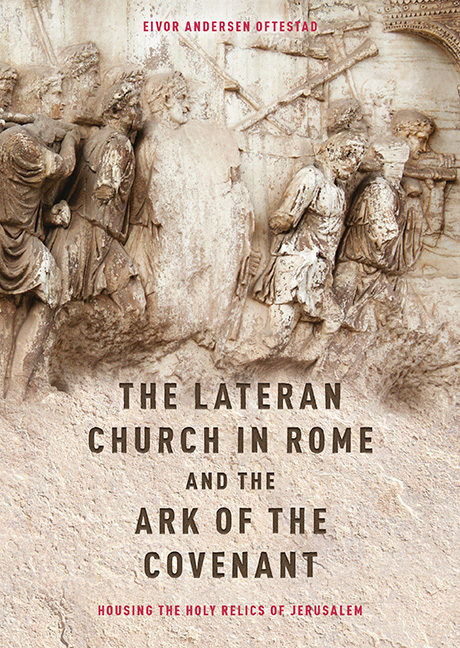 The Lateran Church in Rome and the Ark of the Covenant: Housing the Holy Relics of Jerusalem
The Lateran Church in Rome and the Ark of the Covenant: Housing the Holy Relics of Jerusalem Published online by Cambridge University Press: 31 August 2019
… the little book containing the memory of the most holy things, which have been preserved in the archive of this most holy Basilica by our predecessors until our time, of old age and now almost perished; because it is to the pleasure and delight of Your Holiness, and demanded because it is necessary.
The canons of the Lateran were the prime movers in arguing for the supremacy of their basilica. The extant manuscripts in the Lateran archive provide written evidence of the canons’ thoughts and debates, and it is not difficult to imagine one of the canons talking about the site in a way that resembled the Descriptio as presented in the previous chapter. What was the context for their promotion, and who were their addressees?
An important audience of the Descriptio was provided by the many pilgrims and the legates who arrived in Rome from all over Europe. At the beginning of the twelfth century, the Roman papacy claimed universal jurisdiction, regulating dioceses and monasteries throughout Western Christendom. The papal administration evolved as an organization that governed from Iceland in the north to Sicily in the south, from Portugal in the west to Poland in the east. The most important and effective instrument of papal government was the legation. Legates were dispatched from Rome as envoys with the instruction to implement papal decrees. At the same time, a constant flow of European prelates wended their way to Rome. Among these were newly appointed metropolitans and archbishops who were about to receive their pallia at St Peter's and ecclesiastical representatives who wished to bring appeals before the pope. The Pseudo-Isidorean decretals stated that ‘Appeals are to be made to the Roman church by all, but especially by the oppressed. They should flock to her as to their mother, to be nourished by her breasts, defended by her authority and relieved of their oppressions.’ Until Pope Paschal II (1099–1118) began to delegate cases to members of the curia, the pope judged all cases personally. This meant that the petitioners had to wait, often for weeks or months, until they were summoned into the papal presence. Herman of Tournai was one such disgruntled petitioner who described the delay that he experienced in 1142 when he ‘almost starved from boredom in the Lateran palace’ while awaiting the pope's response.
To save this book to your Kindle, first ensure [email protected] is added to your Approved Personal Document E-mail List under your Personal Document Settings on the Manage Your Content and Devices page of your Amazon account. Then enter the ‘name’ part of your Kindle email address below. Find out more about saving to your Kindle.
Note you can select to save to either the @free.kindle.com or @kindle.com variations. ‘@free.kindle.com’ emails are free but can only be saved to your device when it is connected to wi-fi. ‘@kindle.com’ emails can be delivered even when you are not connected to wi-fi, but note that service fees apply.
Find out more about the Kindle Personal Document Service.
To save content items to your account, please confirm that you agree to abide by our usage policies. If this is the first time you use this feature, you will be asked to authorise Cambridge Core to connect with your account. Find out more about saving content to Dropbox.
To save content items to your account, please confirm that you agree to abide by our usage policies. If this is the first time you use this feature, you will be asked to authorise Cambridge Core to connect with your account. Find out more about saving content to Google Drive.